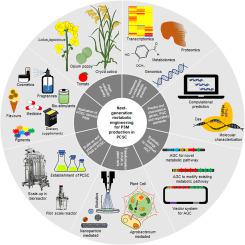Biotechnology Advances ( IF 12.1 ) Pub Date : 2020-09-23 , DOI: 10.1016/j.biotechadv.2020.107635 Sagar S. Arya , James E. Rookes , David M. Cahill , Sangram K. Lenka

|
Plant cell suspension culture (PCSC) has emerged as a viable technology to produce plant specialized metabolites (PSM). While Taxol® and ginsenoside are two examples of successfully commercialized PCSC-derived PSM, widespread utilization of the PCSC platform has yet to be realized primarily due to a lack of understanding of the molecular genetics of PSM biosynthesis. Recent advances in computational, molecular and synthetic biology tools provide the opportunity to rapidly characterize and harness the specialized metabolic potential of plants. Here, we discuss the prospects of integrating computational modeling, artificial intelligence, and precision genome editing (CRISPR/Cas and its variants) toolboxes to discover the genetic regulators of PSM. We also explore how synthetic biology can be applied to develop metabolically optimized PSM-producing native and heterologous PCSC systems. Taken together, this review provides an interdisciplinary approach to realize and link the potential of next-generation computational and molecular tools to convert PCSC into commercially viable PSM-producing biofactories.
中文翻译:

下一代代谢工程学方法将植物细胞悬浮培养物发展为专门的代谢产物生产生物工厂
植物细胞悬浮培养(PCSC)已成为生产植物专用代谢物(PSM)的可行技术。虽然紫杉醇和人参皂苷是成功商业化PCSC衍生的PSM的两个例子,但PCSC平台的广泛利用尚未实现,这主要是由于对PSM生物合成的分子遗传学缺乏了解。计算,分子和合成生物学工具的最新进展为快速表征和利用植物的专门代谢潜力提供了机会。在这里,我们讨论了集成计算模型,人工智能和精确基因组编辑(CRISPR / Cas及其变体)工具箱以发现PSM的遗传调控因子的前景。我们还探讨了如何将合成生物学应用于开发经代谢优化的生产PSM的天然和异源PCSC系统。综上所述,本综述提供了一种跨学科的方法来实现和链接下一代计算和分子工具将PCSC转换为可商业生产PSM的生物工厂的潜力。











































 京公网安备 11010802027423号
京公网安备 11010802027423号